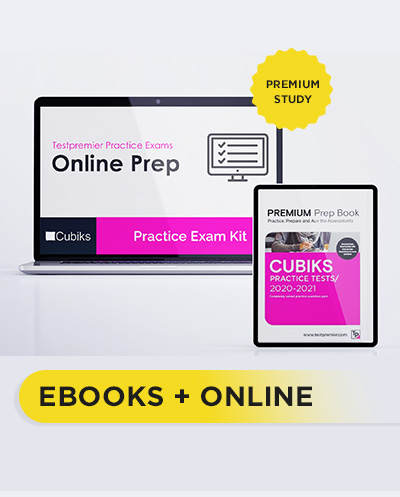
CUBIKS Online Practice Test
The CUBIKS Practice Aptitude Test Pack is a crucial step in your career journey, whether you’re seeking a new job, career growth, or skills development. By understanding the test format, practicing regularly, and adopting a logical and ethical approach, you can enhance your prospects of success. Embrace the opportunity with confidence, and let your true abilities shine through. Best of luck as you embark on this career-enhancing journey with CUBIKS!
CUBIKS, a global leader in talent assessment and development, has been instrumental in helping organizations identify, develop, and retain top talent. If you’re embarking on a journey that involves CUBIKS assessments, you’re on the path to showcasing your skills and abilities to potential employers. In this blog post, we will explore the world of the CUBIKS Practice Aptitude Test Pack, offering valuable insights, strategies, and tips to help you excel.
Understanding the CUBIKS Practice Aptitude Test Pack
The CUBIKS Practice Aptitude Test Pack is meticulously designed to assess a range of cognitive abilities, critical thinking skills, and problem-solving capabilities. These assessments play a pivotal role in recruitment, talent development, and organizational growth. Your performance in these tests can be a significant factor in achieving your career aspirations.
Tips for Excelling in the CUBIKS Practice Aptitude Test Pack
- Master the Test Format: Begin by gaining a clear understanding of the format of the test and the types of questions you’ll encounter. CUBIKS often provides practice materials and sample questions for your preparation.
- Effective Time Management: Managing your time efficiently during the test is crucial. Allocate specific time limits for each question or section to ensure you complete all parts of the assessment.
- Regular Practice: Consistent practice is key to success. Utilize CUBIKS’ practice materials and seek additional resources to sharpen your skills.
- Solid Foundation: Ensure your foundational knowledge in mathematics, language, and logical reasoning is strong. This will provide a solid base for tackling the test questions.
- Careful Reading: In the verbal reasoning section, read the provided text carefully, avoiding making assumptions. Base your answers solely on the information presented.
About CUBIKS company
Cubiks is an international HR consultancy that publishes numerous psychometric/ability tests for its client companies. Cubiks has offices and partners around the world, including Europe, North America, Asia, and the middle east. Cubiks is a global consultancy, and candidates across the globe may encounter a Cubiks psychometric test during their job search, and application processes. CUBIKS mostly uses Watson Glaser-style tests for its candidate selection. The sections on the assessments may include any of the following test sections, depending on the role that you applied to and also the country you are applying from:
- Written Exercise
- Case Study
- Situational Judgement Test
- Presentation
- Proof Reading Test
- Personality Test
Free CUBIKS Assessment Practice Tests and Worked solutions
Question 1: In a written exercise, what is the primary purpose of assessing a candidate’s communication skills?
A) To test their typing speed
B) To evaluate their handwriting
C) To assess their ability to express ideas clearly in writing
D) To gauge their ability to speak confidently
Answer: C) To assess their ability to express ideas clearly in writing
Question 2: What should a candidate focus on when preparing for a written exercise?
A) Grammar and spelling
B) Creating colorful visuals
C) Using as many words as possible
D) Ignoring the word limit
Answer: A) Grammar and spelling
Question 3: Which of the following is NOT a common type of written exercise in assessments?
A) Essay
B) Letter of recommendation
C) Report
D) Data analysis
Answer: B) Letter of recommendation
GET THE PREMIUM VERSION
Case Study:
Question 1: In a case study analysis, what is the first step that should be taken by the candidate?
A) Write a detailed report
B) Identify the key issues and problems in the case
C) Create an executive summary
D) Contact the client for more information
Answer: B) Identify the key issues and problems in the case
Question 2: What is the purpose of a case study in an assessment?
A) To evaluate the candidate’s ability to memorize information
B) To test their knowledge of trivia
C) To assess their problem-solving and analytical skills in a real-world context
D) To see if they can follow instructions
Answer: C) To assess their problem-solving and analytical skills in a real-world context
Question 3: When conducting a case study analysis, what should a candidate do if they encounter insufficient information in the case?
A) Guess the missing information
B) Ignore the missing information and proceed
C) Make assumptions based on personal experiences
D) Highlight the gaps in information and suggest possible solutions or areas for further investigation
Answer: D) Highlight the gaps in information and suggest possible solutions or areas for further investigation

